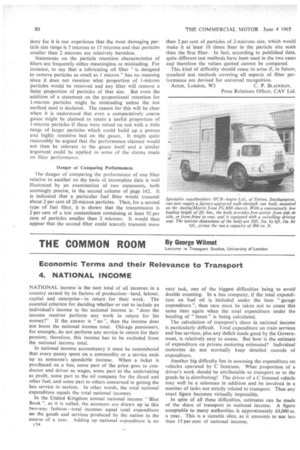Economic Terms and their Relevance to Transport 4. NATIONAL INCOME
Page 82

If you've noticed an error in this article please click here to report it so we can fix it.
NATIONAL income is the sum total of all incomes in a country earned by its factors of production—land, labour, capital and enterprise—in return for their work. The essential criterion for deciding whether or not to include an individual's income in the national income is: "does the income receiver perform any work in return for his money?" If the answer is "no ", then the income does not boost the national income total. Old-age pensioners, for example, do not perform any service in return for their pension; therefore, this income has to be excluded from the national income total.
In national income accountancy it must be remembered that every penny spent on a commodity or a service ends up as someone's spendable income. When a ticket is purchased on a bus, some part of the price goes to conductor and driver as wages, some part to the undertaking as profit, some part to the oil company for the diesel and other fuel, and some part to others concerned in getting the bus service in motion. In other words, the total national expenditure equals the total national incomes.
In the United Kingdom annual national income "Blue Book ", as it is -called, the accounts are drawn up in this two-way fashion—total incomes equal total expenditure on the goods and services produced by the nation in the course of a year. Adding up national expenditure is no c54 easy task, one of the biggest difficulties being to avoid double counting. In a bus company, if the total expenditure on fuel oil is included under the item "garage expenditure ", then care must be taken not to count this same item again when the total expenditure under the heading of " buses " is being calculated.
The calculation of transport's share in national income is particularly difficult. Total expenditure on train services and bus services, plus any deficit made good by the Government, is relatively easy to assess. But how is the estimate of expenditure on private motoring estimated? Individual motorists do not normally keep detailed records of expenditure.
Another big difficulty lies in assessing the expenditure on vehicles operated by C licensees. What proportion of a driver's work should be attributable to transport or to the goods he is distributing? The driver of a C licensed vehicle may well be a salesman in addition and be involved in a number of tasks not strictly related to transport. Thus any exact figure becomes virtually impossible.
In spite of all these difficulties, estimates can be made of the share of transport in national income. A figure acceptable to many authorities is approximately £4,000 m. a year. This is a sizeable slice, as it amounts to not less than 15 per cent of national income.
























































































































